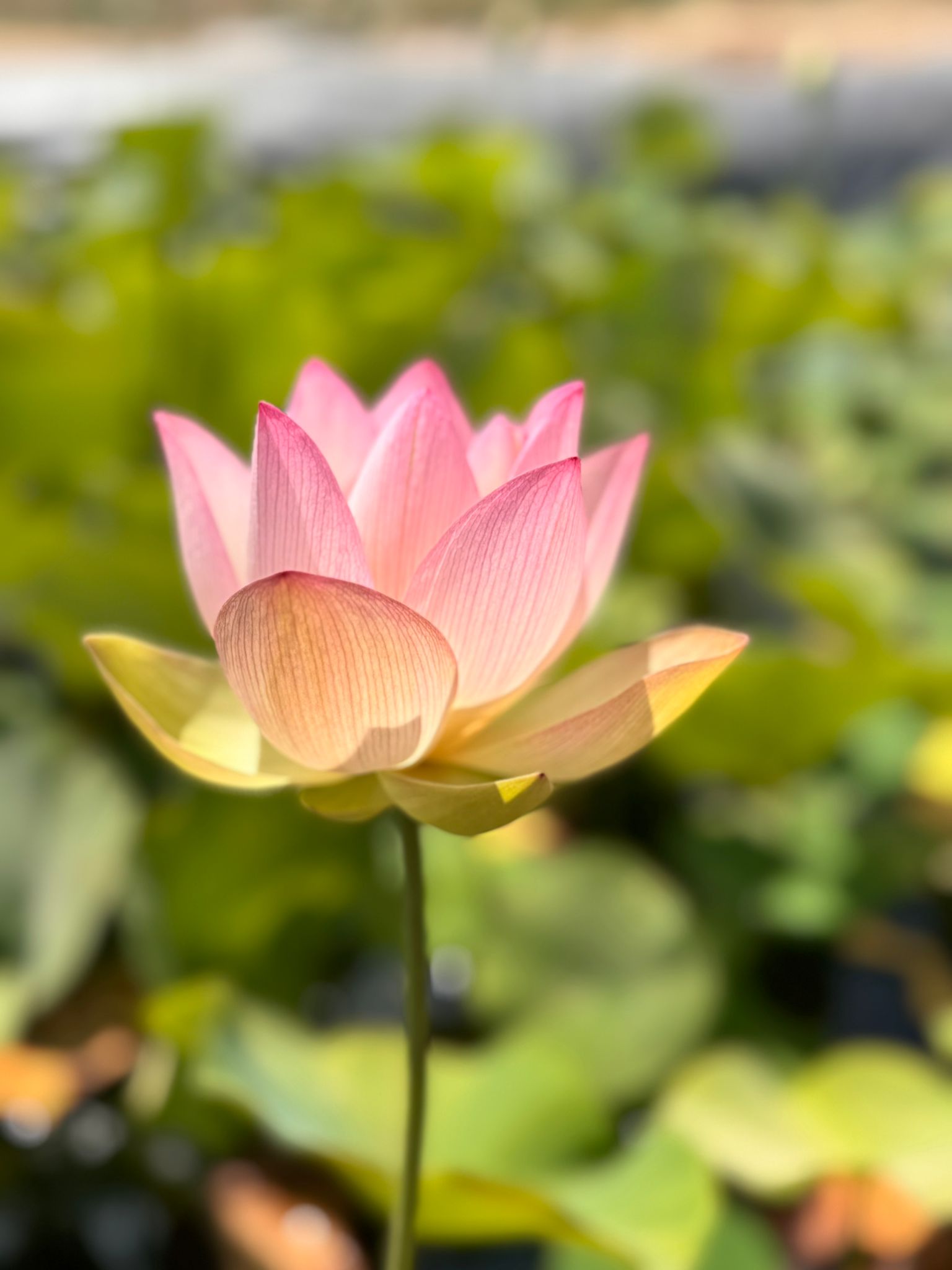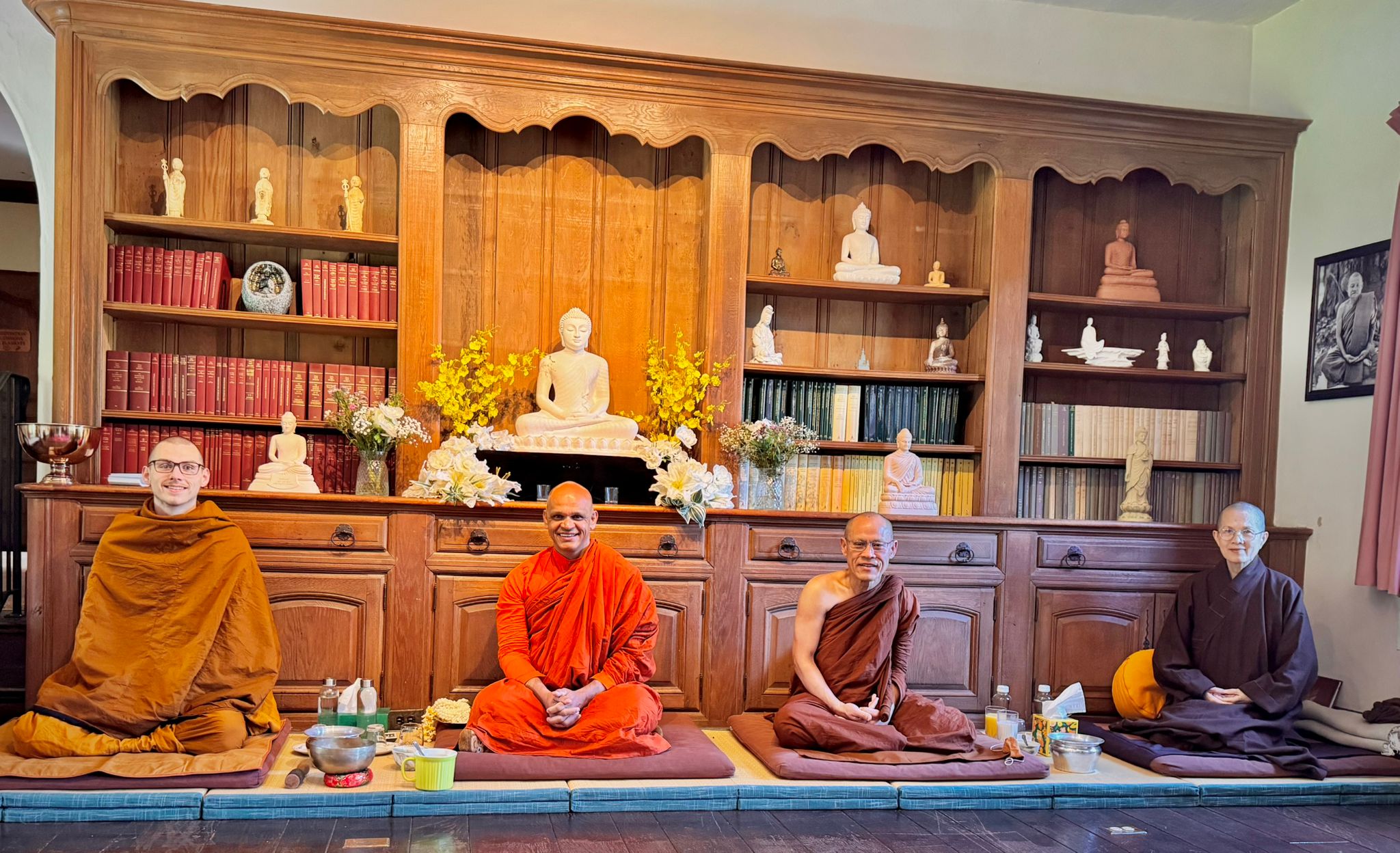The last session of our online webinar commemorating Vesak Day will be tomorrow. We warmly welcome you all! Our final Online session will take place tomorrow Date: 28th May 2025 Time: 7:00pm – 8:30pm Resource Person: Dr. Bhante Sumitta (Founder of the Dhamma USA, Former Lecturer of Bhkkhu University in Sri Lanka) Moderator: Lakmali Marasinghe […]
NEWS
Wisdom Shining Like a Lotus in the Mud By Dr. Bhante Sumitta
Photo Reflection Inspired by the Dhammapada Verses 58-59 (Garahadinna Vatthu) Pali Verses Yathā saṅkāradhānasmiṁ, ujjhitasmiṁ mahāpathe, padumaṁ tattha jāyetha, sucigandhaṁ manoramaṁ. Evaṁ saṅkārabhūtesu, andhabhūte puthujjane, atirocati paññāya, sammāsambuddhasāvako. Translation Just as a beautiful and fragrant lotus may bloom amidst a heap of rubbish discarded by the roadside, Even so, among the blind and deluded worldlings, […]
A Joyful Gathering of the Sangha at Empty Cloud Monastery, New Jersey
We were blessed to witness a beautiful gathering of monks and nuns from four different countries at the serene and inspiring grounds of Empty Cloud Monastery in New Jersey. The peaceful and lush green environment, combined with the warm hospitality and presence of true kalyāṇamitta (spiritual friends), made this experience truly special. As the Buddha […]
Vesak Celebration 2025
Commemorating the International Vesak Celebration 2025 With Compassionate Hearts — Bringing Healing to a Troubled World Join us for a special Online Webinar in celebration of Vesak, the most sacred day for millions of Buddhists around the world. This year’s theme reflects our collective aspiration to bring healing, compassion, and wisdom to a world in […]
Buddha Vandanā – Pali & English Translation
VANDANĀ – Homage Homage to Him, the Blessed One, the Exalted One, the Fully Enlightened One! TI-SARAṆA – Three Refuges I go to the Buddha as my refuge. I go to the Dhamma as my refuge. I go to the Sangha as my refuge. For the second time, I go to the Buddha as my […]
The Enlightened One – Dhammapada – Arahanta Vagga | Dr. Bhante Sumitta | #110
By Nivitigala Sumitta (Bhante Sumitta) Sunday Dhamma Talks – November 3, 2024 The Enlightened One – Dhammapada – Arahanta Vagga | Dr. Bhante Sumitta | #110 We are thrilled to invite you to the 110th session of our Sunday Dhamma Talks series on November 3, 2024. This week, we will explore the profound themes of […]
The Path of the Wise – Dhammapada – Paṇḍita Vagga | Dr. Bhante Sumitta | #109
By Nivitigala Sumitta (Bhante Sumitta) Sunday Dhamma Talks – October 20, 2024 The Path of the Wise – Dhammapada – Paṇḍita Vagga | Dr. Bhante Sumitta | #109 We are thrilled to invite you to the 109th session of our Sunday Dhamma Talks series on October 20, 2024. This week, we will explore the profound […]
Wisdom Over Foolishness – Dhammapada – Bāla Vagga | Dr. Bhante Sumitta | #108
By Nivitigala Sumitta (Bhante Sumitta) Sunday Dhamma Talks – October 13, 2024 Wisdom Over Foolishness – Dhammapada – Bāla Vagga | Dr. Bhante Sumitta | #108 We are thrilled to invite you to the 108th session of our Sunday Dhamma Talks series on October 13, 2024. This week, we will explore the profound themes of […]
Subduing Hatred – AN 5.162-Āghātavinaya Sutta | Ven. Bhikkhu Sugatananda | #107
By Nivitigala Sumitta (Bhante Sumitta) Sunday Dhamma Talks – October 6, 2024 We are thrilled to invite you to the 107th session of our Sunday Dhamma Talks series, taking place on October 6, 2024, at 6:00 AM Pacific Time (PT), 9:00 AM Eastern Time (ET), and 6:30 PM Indian Standard Time (IST). This session is […]
Mahāpajāpatī Gotamī: The Founder of the Bhikkhuni Order
Mahāpajāpatī Gotamī stands as a pivotal figure in the history of Buddhism, known as the founder of the Bhikkhuni Order. As the Buddha’s foster mother and maternal aunt, her journey was marked by profound dedication, compassion, and a steadfast commitment to spiritual liberation. Despite the societal norms of her time, she demonstrated immense courage by advocating for the ordination of women, leading to the establishment of the Bhikkhuni Sangha.
Her life story spans multiple lifetimes, showcasing acts of generosity and service that culminated in her attaining Arahantship. Mahāpajāpatī’s unwavering resolve paved the way for countless women to pursue the path of Dhamma. Her legacy is a testament to the Buddha’s inclusive vision and the transformative power of the Dhamma, highlighting that the potential for enlightenment lies within all, regardless of gender.







